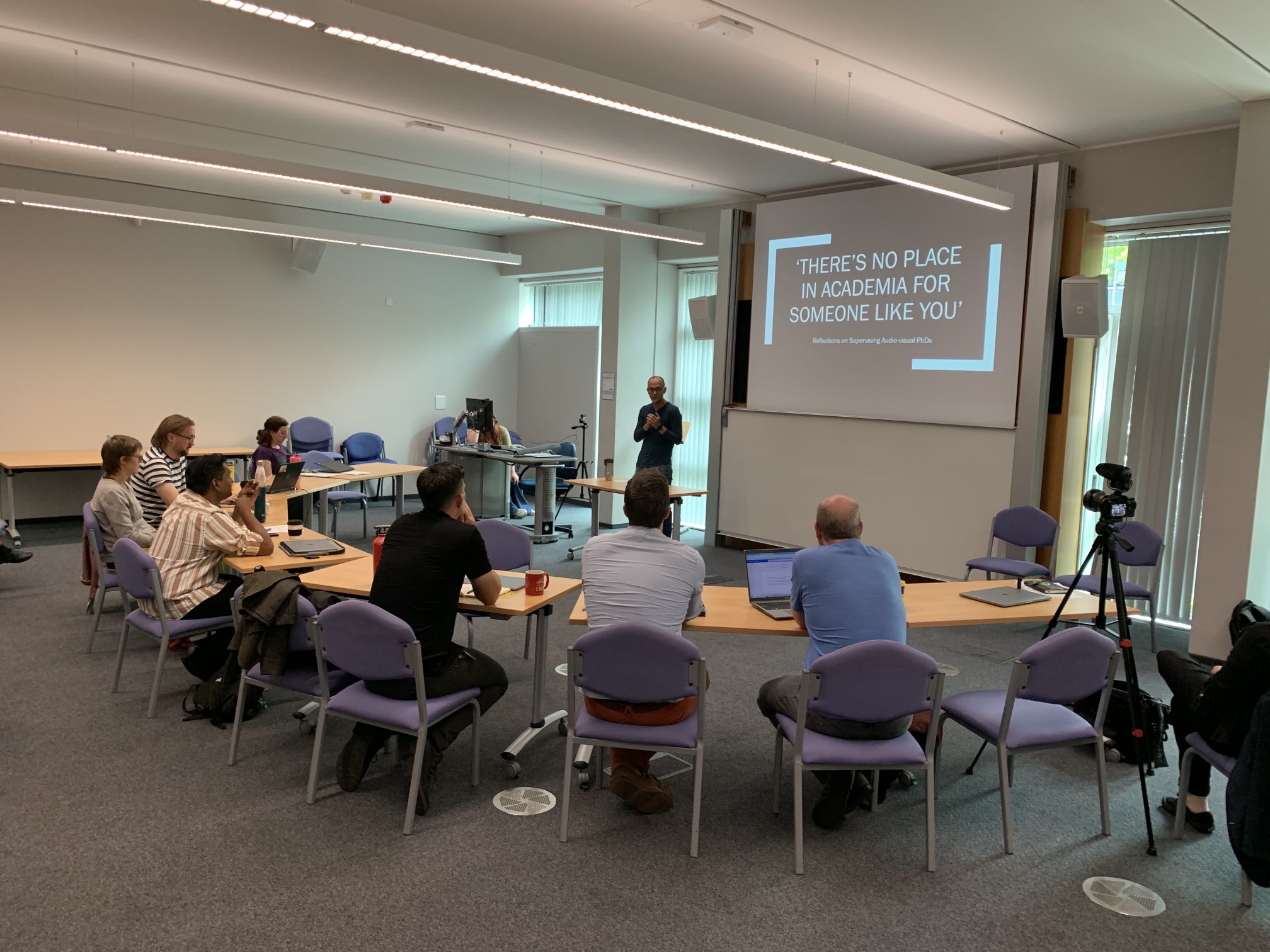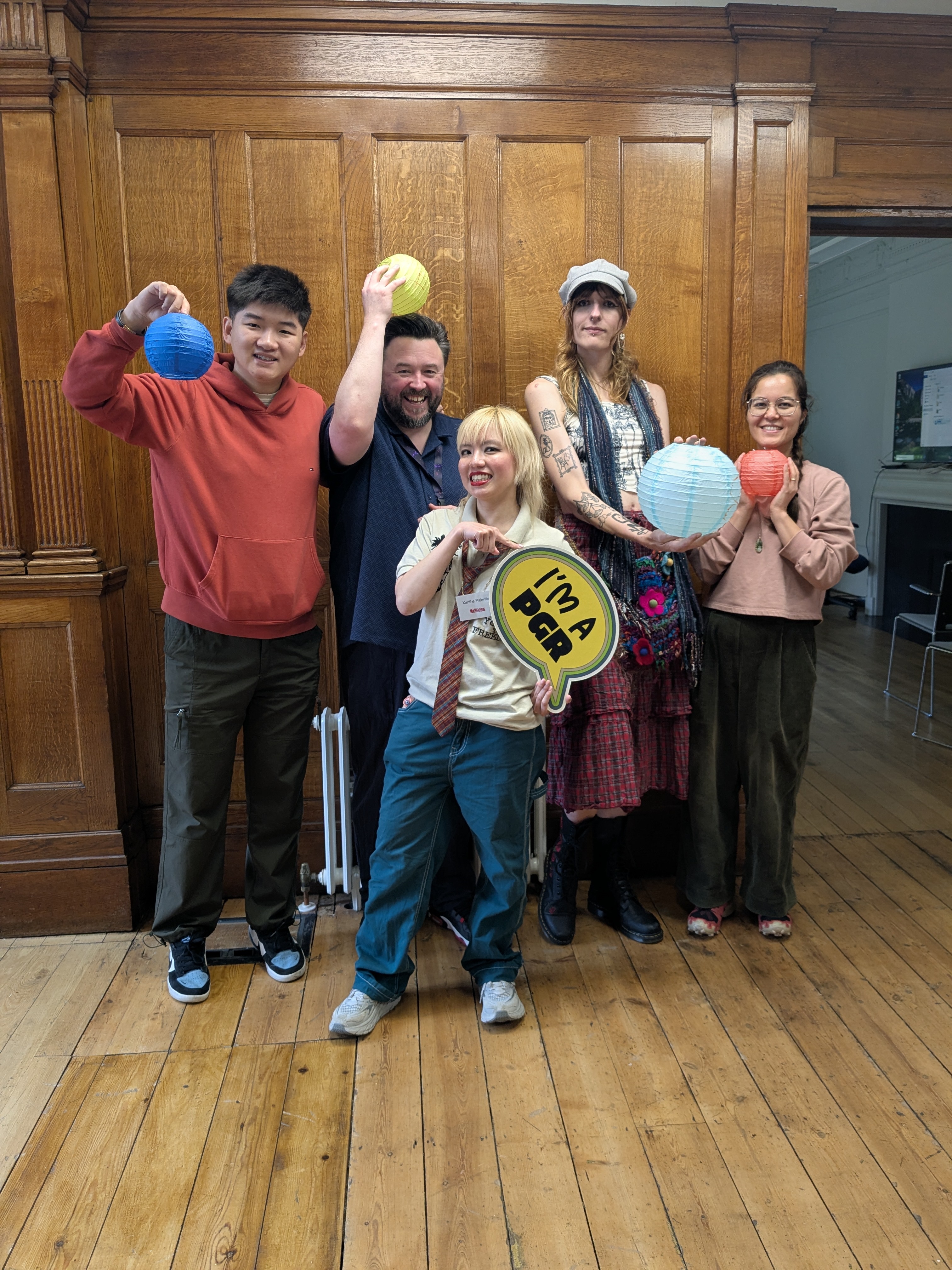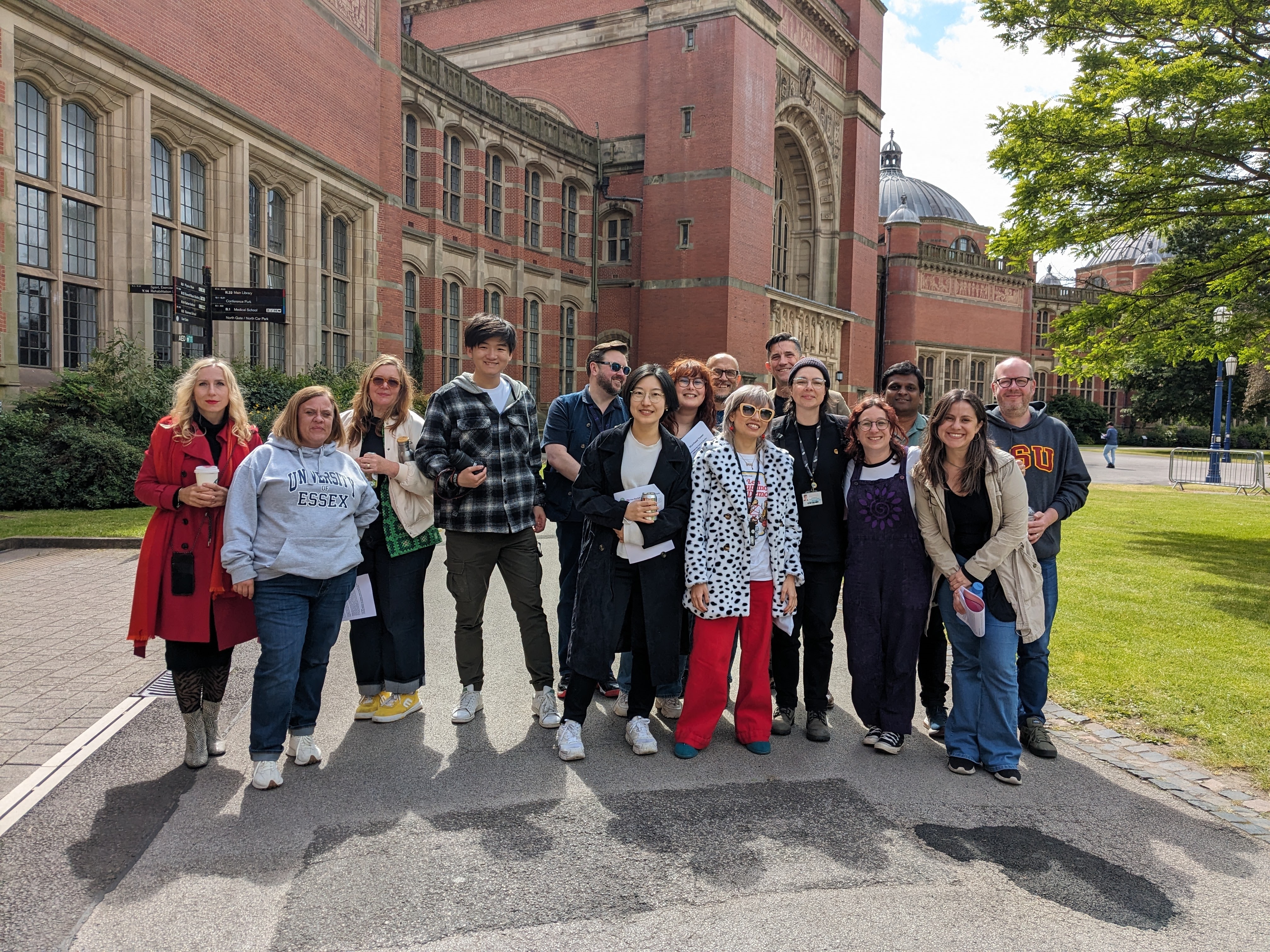Creative Practice Colloquium: Putting the “me” in Academy (Birmingham, Uk, 5-6 June, 2025)
By Rich Matthews and Jemma Saunders (University of Birmingham)
A central question was posed during the keynote sessions for the University of Birmingham’s 2025 Creative Practice Colloquium: ‘When did we start apologising for bringing ourselves into our research?’
This core tension has been at the heart of the CPC since its inception in 2023, which opened with Dr Richard Langley’s keynote provocation: ‘There’s no place in academia for someone like you.’ Now Head of the Film and Creative Writing Department, Richard led the Audiovisual PhD discussion group from which the CPC evolved, with the first iteration developed and delivered by Nina Jones, Jemma Saunders and Ella Wright. \

Two years on, the third CPC builds on this foundation. Where 2023 posed questions of identity and methodology and 2024 explored concepts of industry and institutions, 2025 investigated how individual voices enrich scholarly discourse. The theme – ‘The Individual Voice in Academia: Blending Creativity and Scholarship’ – continues the natural progression of the CPC, each colloquium generating momentum for the next, growing organically from its audiovisual/screen origins to embrace practitioners across music, creative writing, and drama. What began as a response to ‘gappage’ – gaps in community, academia, and practical industry – has developed into a testing ground for how creative practice both shapes and reshapes academic engagement.
An ‘unconferencing’ approach remained central this year, while the trio of keynote speakers demonstrated how personal voice operates across disciplines. Prof. Luke Kennard’s dual identity – accomplished poet whose sixth collection, Notes on the Sonnets, won the Forward Prize in 2021, and university professor – embodied the tension the colloquium interrogates. Here was someone refusing to compartmentalise creative output from academic identity.

Dr. Eleanor Yule brought industry credentials alongside academic insight, her trajectory from documentary filmmaker to PhD researcher exemplifying ‘crossing the aisle’ from industry to the Academy. Her work on forgotten female troubadours of 12th-century France showed how personal research interests uncover overlooked histories. Finally, Dr. Tom Attah’s life as touring musician and popular music scholar demonstrated that multiple professional identities can coexist in harmony, enhancing rather than diluting academic rigour.
The second day’s ‘making’ took this further. Themed around ‘self-talk’ – a deliberate pun interrogating how the self operates in practice, institution, and academy – participants worked without pressure, some individually and some collaboratively, to produce creative outcomes responding to this central idea. Process over product. Investigation over presentation. The theme proved apt, with participants exploring not just how they articulate research, but how individual perspectives challenge institutional discourse. This wasn’t navel-gazing, but methodological inquiry into how subjectivity becomes a scholarly tool rather than something to overcome.
What emerges is a model refusing the false choice between personal meaning and intellectual rigour. The CPC demonstrates that bringing yourself into research isn’t indulgence: it’s often where innovative thinking happens. The challenge lies in translating these insights beyond Westmere House on the University’s Edgbaston campus into broader academic structures. Creative practitioners aren’t fighting to justify our places at the academic table: we’re redesigning the room. This is transformation rather than accommodation; recognising universities need creative voices as essential contributors to intellectual innovation.
The organisers’ commitment to welcoming emerging doctoral researchers alongside established academics with industry experience suggests sustainable change requires coalition-building across career stages. As universities face pressure to demonstrate relevance beyond disciplinary silos, the CPC offers a blueprint for academic engagement that is intellectually robust and creatively vital.
The aforementioned question posed in one of the keynote sessions – about when we started apologising for ourselves – points to something deeper. It challenges assumptions that underlie how knowledge gets made, validated, and shared. If the CPC has achieved anything over three iterations, it’s proving that there’s no need to apologise for bringing your whole self to research and for being creative while doing so. The Academy is richer for it.

Looking ahead, one can imagine CPC 2026 building on these foundations: perhaps three days of meeting, greeting and making, where boundaries between presentation and practice dissolve entirely? Whether participants gravitate toward collaborative workshops, choose to share work through informal presentations, or simply claim time and space to develop practice alongside fellow researchers, the event can become whatever its community needs – a genuinely responsive platform and time where creative practice researchers and academics don’t just share and learn, but actively shape their field’s future through collective making and thinking.
We can’t wait for next year!
- Find out more about the CPC here: https://cpcuob.wixsite.com/online
- The 2025 organising committee of the CPC was Rich Matthews, Xanthe Pajarillo, Beth Preece, Radha Smith and Qinran Wang, who are all doctoral researchers from the Department of Film and Creative Writing, producing creative practice work as core parts of their theses.
Bios
Rich Matthews is a PhD candidate in screenwriting exploring fandom, religious behaviours, and parasocial relationships through Star Trek and Scientology. He balances roles as Teaching Fellow at University of Birmingham and Development Director at Rural Media Charity. With 25 years of experience at BBC, Sky, Disney, and Warner Bros, Rich has worked as a writer, filmmaker, journalist, editor, and lecturer. His UCL background in Experimental Psychology and training in cognitive behavioural hypnotherapy inform his unique approach to media. Rich’s academic journey began at the British Film Institute, and he remains active in screenwriting research while continuing to create films.
Jemma Saunders is a doctoral researcher at the University of Birmingham, working towards completion of an audiovisual thesis that explores screen representations of Birmingham. Her research interests include documentary, videographic criticism, production locations, television, and history on screen. She was shortlisted for a Learning on Screen Award in 2024 and has published video essays in Academic Quarter, Tecmerin and Mediapolis Journal. Alongside her part-time PhD, she manages placements for the University’s MA in Film and Television: Research and Production.
